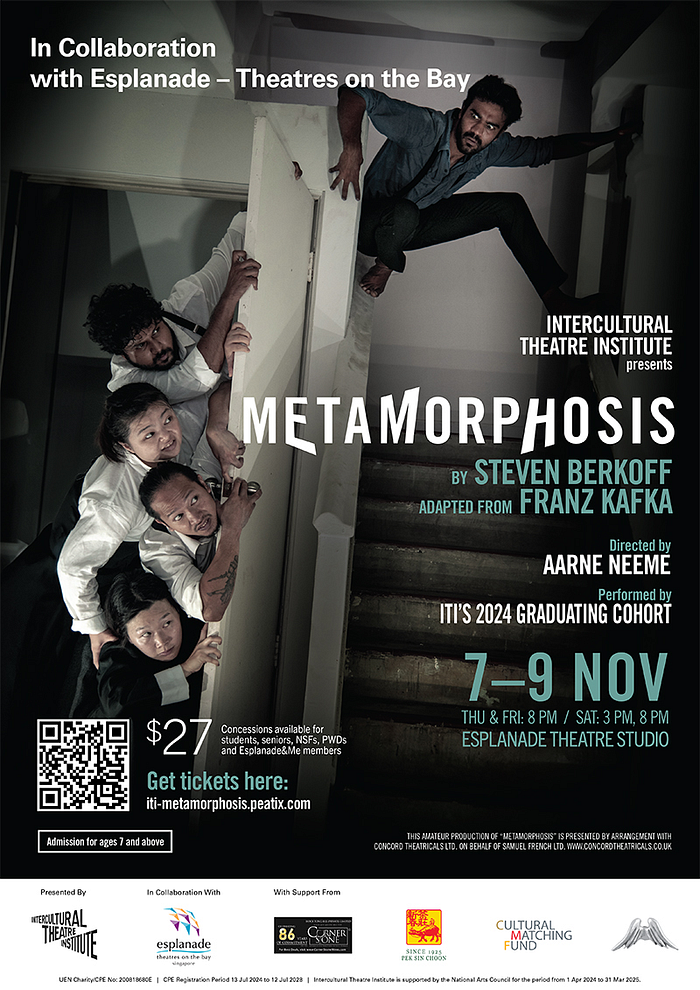Review: Metamorphosis by Steven Berkoff, adapted from Franz Kafka; performed by ITI 2024 Graduating Cohort (or “Starfall”)

(Note from the playwright: This brief draft of a play was written as a response to the play Metamorphosis by Steven Berkoff, adapted from Franz Kafka, performed by the ITI 2024 Graduating Cohort. I have long been wanting to respond to plays and theatre in a way that deviates from the stereotypical long-form essay style of most reviews out there in the world, and I found writing a story freeing in that I do not always have to say, point-blank, what I think about a piece of work. Some feelings, thoughts, and experiences cannot be expressed directly, and that is one of the greatest lessons/reminders I have taken away from this year.)
Scene I— Licht
(Lights up. A single spotlight on A and B, both of whom are sitting on a long wooden park bench with metal arms and legs, placed beneath a lamp-post. They are silent for a while.)
A: (pause) You know, I recently went to watch a show. A theatre show. Metamorphosis, by Steven Berkoff, adapted from Franz Kafka.
B: …why are you telling me this?/
A: (without stopping) / If you don’t know, it’s a play that speaks deeply about the alienation of one’s identity, and the pressures of societal expectation — how, as individuals, we are only as valuable as what we provide to our loved ones, which, in Gregor’s case, is his family —
B: So you’re saying I only care about you because you provide for me?
A: I didn’t say that, you said it.
(B looks as if they are about to retort angrily, but holds themselves back. Both of them are silent again, for a while.)
A: I kept thinking to myself: “why do they keep asking him if he wants to drink the milk?”
And the more I saw this facade of kindness — this fake show of care and concern for Gregor, that’s made even more strange by the exaggerated ways in which they behave and act — the more I finally realised:
oh. that’s me.
B: (pause) What d’you mean?
A: Like when you ask me if I’m coming home late today. Or if I’m passing by that pizza place you love so much. Or if I have any big projects coming up next year — and if that would mean I needed to work late more often. And if the company’s ever hiring — and if I could put in a good word for you.
I kept thinking, you know, when all this — when we… first started — it was you trying to find more time to spend with me.
B: But it was —
A: No. I don’t think so.
I think maybe that’s what you thought it was. So maybe you don’t know yourself as well as you think you do.
B: And you do? You know perfectly well what you want for yourself and your life and the people you love — ALL the time?
A: At least when I dont’t know things — not knowing it, doesn’t hurt other people.
B: That’s mean. And that’s not fair to me. You know that. You KNOW that.
(A is silent.)
A: Metamorphosis eventually ends with Gregor’s family moving on, getting jobs, his parents thinking about finding a life partner for his younger sister, Greta, as she’s grown up well and the family is now well-off because they all have jobs, in comparison to how they were when it was only Gregor working. Which then begs the question — did Gregor’s assumption of the role as breadwinner ultimately stymie their personal growth as humans, in learning to take care of themselves? If, perhaps, he had set his boundaries clearer regarding how much he could only provide for them, and insisted they get jobs of their own, would he not have died, then?
(Note from the playwright: B can see fit to interrupt A’s monologue about the play at any time they feel suitable. In fact, they should.)
B: Can you stop talking about the goddamn stupid play for once already?!
A: You had to be there to see it.
B: I wasn’t free, okay?!
A: …you’re free, when you want to be. And you’re not when you don’t want to be.
B: That’s not fair.
A: What is, then? Isn’t love about making time for each other? Prioritising each other?
B: Love isn’t abandoning yourself for another person.
A: I think you should be saying that to yourself.
(The couple falls silent, once again.)
A: Did you mean it?
B: Mean what?
A: Mean those things you said — all the way at the beginning.
When you said you saw in me — a best friend, someone to talk to, someone exactly like your best friend, only someone that you could date, someone with so many similarities… oh, I don’t know, just so many ways in which we were the same. You called me the date-able version of you.
Did you mean it?
B: (silence)
B: Can we just… move on? I don’t want to talk about this anymore.
Why can’t we just… move on?
A: Because I can’t move on.
B: So… what, it’s just over?
A: Not unless you wanna talk about it. And do something about it.
B: Why can’t you be the one to do something about it? I don’t know — talk to a therapist or something…?
A: I’m not having this conversation again.
B: You were the one who said you wanted to talk.
A: That was before — way before — I knew you didn’t want to.
And you always don’t want to.
(B is almost in tears at this point. They are in anguish.)
(At some point during A’s next monologue , B will silently get up from the bench, and exit. Both A and B’s expressions are blank. As B leaves, the spotlight crossfades into a general wash, as A is revealed to be sitting alone on a light sunny day on the bench.)
A: Bourdieu posits, in his 1979 work La Distinction, the theory of how we are all playing a game — or perhaps functioning within a “gamified” world — where, in all of our distinct social contexts, be it going to school, or to the office, we are all playing within social contexts known as fields.
Within these fields, we have been conditioned and socialised from young by those that came before us regarding how to behave, what behaviours result in rewards — that can come to us not just via material gains, but also in intangible ways as well — and what behaviours result in punishment — perhaps through social disdain.
One could argue then, that Gregor’s family, in their eventual alienation of him —seemingly because of his new and changed physical appearance — are only acting as how society has influenced and socialised them into acting. Because, presumably, society has constantly enforced its ideals of aesthetics and beauty and judged creatures looking like Gregor’s new physical appearance to be ugly, and therefore, his family now considers him ugly.
One question remains however:
Does resentment emerge because of the hardship and pain of circumstances that befall us? Or is our ability and inherent capacity to resent that which restrains and suffocates us innate and inborn within us from the moment we emerge into the world?
(Blackout.)
Scene II — טונקל
(Lights up. A and B sit across from each other in a Rivervale-esque ice cream parlour. The remains of dinner? dessert? lie strewn on the diner table before them as the lights come up on them laughing and talking.)
A: …and so, I dropped the Haribo plastic tin of gummy worms on the table and said, “Are these the CAN of worms you were looking for?”
B: (laughing) hahaha, oh my that’s… really funny —
A: Yeah, haha.
(A brief silence falls between them, as they recover from laughing and settle into smiles.)
A: I’m really sorry to hear about, um, how things ended with him.
B: It’s alright — thank you so much for listening though. But yeah, I’m alright. It’s just… I think… I needed time? Time… and people. To snap me out of it, and realise that he wasn’t good for me. In all senses and all ways and in all worlds.
A: Mmm, that’s good to hear. I hope that means you’ll know what better things to look out for next time.
(The silence falls — again. B glances sideways here and there, occasionally glancing up at A, as if they have something to say.)
B: Yeah… I don’t know about that. I mean — it’s hard to say when someone who we could date could along, I mean —
A: (abruptly) wait, we? What do you mean?
B: (hurriedly) Oh no, I meant, “we” as in a generic “we” like, erm, “it’s hard to say when someone whom a specific person could date might come along” not like, you know, “we” as in “the two of us” but erm… err… yeah…
(A long silence falls between them.)
A: Ok, but … hypothetically.. have you ever… I don’t know… thought about us dating?
(Silence.)
B: Well, I haven’t thought about it. (pause.) But… I do think… we do have a lot of things in common. You remind me of… my best friend. Someone I feel safe around. Someone I could… go out every day with and not be tired of. Someone who’s… real. With me.
(There is no response from A. Silence.)
(Blackout.)
Metamorphosis by Steven Berkoff and adapted from Franz Kafka was the second graduation production of ITI’s 2024 graduating cohort. This gripping retelling of Franz Kafka’s iconic novella melded abstract physical theatre and psychological drama with elements of dark comedy.
The story follows Gregor Samsa, a young man who wakes up one morning to find himself transformed into a giant insect. As he grapples with his new grotesque form, Gregor’s once-supportive family begins to unravel, revealing deep-seated fears and hidden resentments. Set in a claustrophobic atmosphere with minimalist staging, the play explores themes of alienation, identity, and the crushing weight of societal expectations.
This adaptation of Metamorphosis remains faithful to Kafka’s original work while showcasing Berkoff’s unique approach to theatre. The result is a production that not only reflects on the fragility of identity and the human condition but also resonates with contemporary audiences facing the pressures of modern society.
For more information, please refer to the programme booklet here.
